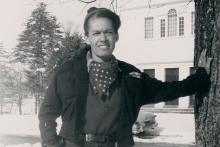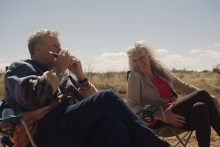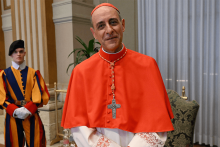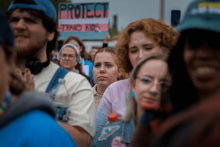transgender

MY ANCESTORS ARE the Indigenous people of the Samoan Islands in the Pacific Ocean. The island chain is now separated by its colonial legacies: At one point, Germany and New Zealand controlled what is now the Independent State of Samoa, and the United States remains in territorial control of American Samoa.
The consequences of that history forced me to turn inward and clearly hear the lamentations of my ancestors. I think many Indigenous people with similar colonial wounds would agree we just want to heal from our pain. And the only appropriate remedy is justice.

Camins Bretts, who is 61 and lives in Seattle, has crossed the Canada-United States border many times for work, family and romantic partners. But because he’s a transgender man, at least half a dozen of those trips ended in him being detained by U.S. border officials.

ON THE THIRD day of President Donald J. Trump’s second term, I saw a tweet that assaulted my spirit. A Utah church deacon and self-described “Christian husband and father” named Ben Garrett went viral for posting a picture of the Episcopal bishop of Washington, D.C., Rev. Mariann Edgar Budde, with the following caption: “Do not commit the sin of empathy. This snake is God’s enemy and yours too. She hates God and His people. You need to properly hate in response. She is not merely deceived but a deceiver. Your eye shall not pity.”
The day before, Budde had preached a pastoral and prophetic sermon at the inaugural prayer service for Trump and Vice President J.D. Vance. She made a direct plea to President Trump to “have mercy upon the people in our country who are scared now” — specifically naming transgender and undocumented children who feared what the new administration would mean for them. Garrett’s tweet — which received almost 5,000 likes and nearly 24 million views — was a rebuke of Bishop Budde’s call to have empathy toward two groups of people who Trump and his supporters have consistently demonized, attacked, and marginalized.
When I researched the phrase “the sin of empathy,” I was led to some right-wing Christian influencers and writers, whose arguments often boil down to the old directive to “love the sinner, hate the sin.” Far too often, I’ve found this to be a mere pretext to act against individuals and groups in fear- and hate-driven ways that can result in violence. Empathy doesn’t mean you have to agree with someone’s choices or perspective. Instead, it enables us to get more proximate to people’s pain and perspective as we honor the image of God that is within every person.

Faith leaders, historians, and advocates are speaking out after the National Park Service removed its webpage dedicated to Rev. Pauli Murray, a pivotal figure in civil rights history who broke barriers as both a legal scholar and the first perceived Black woman ordained as an Episcopal priest.

THE DAY AFTER I told my mother I was transitioning, I sat across from a childhood friend, who I’ll call Sarah, in Los Reyes, my favorite Mexican restaurant in my hometown. It was 2009, and I had come home from college specifically to give my mom the news. I hadn’t seen Sarah in six years but I remembered she had a strong faith that she shared openly and invitationally. As soon as I sat down, she asked how I was doing. Something in me broke open, yearning to be seen. I was a mess — sadness and anger dipping in and out of despair. I said something like, “My mom’s just never understood me, and now she’s not going to try to understand.” Sarah got quiet and nodded before replying, “So? I don’t understand either, but I’m here because I love you.”
Whatever I said in response doesn’t matter as much as the truth I learned: Friends and family can love and support one another without understanding them.
In last year’s documentary Will & Harper, Harper Steele, a trans comedy writer living in New York, has one such friend in the comedian Will Ferrell. At the beginning of the documentary, we learn that Steele announced the news of her transition via an email to her loved ones, Ferrell included. Upon hearing the news, Ferrell, who’s been friends with Steele since the two met on Saturday Night Live 30 years ago, is shocked but wants to be supportive — he’s just not sure how.
“So many of us don’t know what the rules of engagement are,” Ferrell says. “And in terms of our friendship and our relationship, it’s uncharted waters.” So he invites Steele to go on a road trip with him.
Ferrell describes Steele as a rough-and-tough, beer-drinking Midwesterner who loves finding seedy roadside bars and truck stops on cross-country drives. But both he and Steele are worried those dive bars will not be safe now that Steele is living as a woman. So the motivation for the trip is twofold: They can learn how to navigate the new circumstances of their friendship, and Steele can learn to navigate the places she’s always loved — this time as the person she’s always known herself to be.

By now, you may know that men, broadly speaking, are suffering. Despite the structure of a patriarchal society where men still reap various financial and social benefits, men are regularly facing disparate outcomes on a wide range of measures. Nearly four times as many men as women died by suicide in the U.S., 1 in 7 men report having no close friends, and men see disparate outcomes in mental health, premature deaths, and education.

There is not much that Rebecca Jane Morgan appreciates about Pat Robertson, the right-wing evangelical pastor and political figure who died in June. But one moment from his life sticks out in her mind. In 2013, Robertson was asked on-air about gender affirmation surgeries (referred to as a “sex-change” surgery). The usually hardline conservative offered a nuanced answer. “I don’t think there’s any sin associated with that,” Robertson said. “I don’t condemn somebody for [pursuing gender affirmation surgeries].”

Transgender people can be godparents at Roman Catholic baptisms, witnesses at religious weddings, and receive baptism themselves, the Vatican’s doctrinal office said on Wednesday, responding to questions from a bishop.

My trans nonbinary identity means freedom to step outside of the gender binary. My gender does not define me first; rather, I am first a human and a beloved child of God. This trans nonbinary identity and my Christian faith have always been intrinsically linked; my experience of queer joy is not separate from the joy I have in my salvation. I think of this joy through a trinitarian lens: At its core, my queer joy is the joy of knowing the Father has created my unique identity and calls it very good, that Christ “queers” or subverts the norms of this world, and that the Holy Spirit is continually forming me to love this world as my full self.

I know some Christians do not fully share my theological convictions about gender and sexuality, but on issues of human dignity and civil rights, the church should be firmly united: Transgender and nonbinary siblings are God’s children made in God’s very image and likeness. Prohibiting lifesaving medical care, tolerating discrimination, or denying someone the ability to use their name is wrong; you cannot deny people those rights because you disagree with their beliefs about gender or sexuality. Christians should be standing in the breach in defense of the full humanity, dignity, and rights of their trans siblings.

Nearly 30 groups of Catholic nuns, totaling more than 6,000 people across 18 states, signed onto a statement celebrating Trans Day of Visibility and calling people to resist anti-transgender legislation in their states.

In my last years of college before I started seminary, I was in the wilderness. I had to finally grapple with feelings I’d been trying to avoid for years: that I was attracted to women, and that something about the gender I’d been assigned wasn’t right.

“GIRLS JUST SIT AROUND and talk about being friends, but the boys go on daring adventures!” Arkansas first-grader Evan’s less-than-feminist argument for joining the Boy Scouts became the title of his mother’s book. Rachel A. Cornwell wrote Daring Adventures: Helping Gender-Diverse Kids and Their Families Thrive for kids exploring gender identity in unsupportive communities and for families seeking to support them. A United Methodist pastor, Cornwell emphasizes that full acceptance of transgender and gender-diverse people is entirely compatible with a life of faith.
At a time when Christians are championing anti-trans legislation, it is critical that cisgender, heterosexual Christian leaders publicly affirm trans and gender-diverse people. With the high rate of suicide among trans youth who experience rejection from family or community, books like Cornwell’s save lives.
For Daring Adventures, Cornwell draws from her own family’s experience with Evan’s gender transition and shares insights from interviews with nearly 20 other families of transgender and gender-diverse children. I was particularly touched by the high schoolers who started an online group for younger kids: They talked about favorite animals, transgender celebrities, and drew pictures of their future selves.

ACCORDING TO AN Orthodox miracle story, St. Nicholas — the fourth century archbishop who inspired the figure of Santa Claus — quieted a raging sea. When sailors were caught in a storm on the Mediterranean, they called out for help. Nicholas appeared, walking on the waves before them. He blessed the ship, and the storm calmed. This is why he became the patron saint of sailors. It’s also why Mary Marza, a queer Orthodox artist in her mid-20s who is based in Los Angeles, illustrated St. Nicholas as a “waterbender.” Waterbenders, from the animated series Avatar: The Last Airbender, can control water and its movements. This is one of many works featured on her Instagram art account, Art of Marza.
“I liked the concept of blending saints with the elements or just blending the saints with things from my favorite stories and pop culture,” Marza wrote in an Instagram caption about this portrayal of St. Nicholas.
Marza (who asked to use her art account name instead of her real last name for this article) creates digital art and stickers that blend Orthodox iconography and prayer with street art and anime. The grungy, graffiti-and-animation-inspired aesthetic of her art and its confluence with iconography is part of her longing to “[see] God in places where people assume we can’t find Him,” she wrote on Instagram.

So when I read about people like Katie, one of many affirming parents who are leaving Texas because of the threat of having their transgender child taken from them, I think of the way the women at the tomb fled in fear. And when I hear Maddie, a trans girl in North Carolina, say, “If I didn’t have my hormones or my [puberty] blocker, I’d be very unhappy, and I wouldn’t want to leave the house sometimes,” I think of the disciples with the door locked on Easter evening.

March 31 marks the annual International Transgender Day of Visibility. I will confess that I only recently became aware of this day, which is “dedicated to celebrating the accomplishments of transgender and gender nonconforming people while raising awareness of the work that still needs to be done to achieve trans justice,” as GLSEN, an organization that advocates for LGTBQ issues in K-12 education, puts it.

The Supreme Court on Monday declined to hear a bid by a Catholic hospital in California to avoid a lawsuit over its refusal to let its facilities be used to perform a hysterectomy on a transgender patient who sought the procedure as a part of gender transition from female to male.
The justices turned away an appeal by Mercy San Juan Medical Center, a Sacramento-area hospital owned by Dignity Health, and let stand a lower court ruling that revived Evan Minton’s lawsuit accusing it of intentionally discriminating against him in violation of California law because he is transgender.
The justices on Monday also bolstered a Roman Catholic-led challenge to a New York state requirement that health insurance policies provided by employers cover abortion services. The justices told a lower court to reconsider its decision to throw out a bid by the Roman Catholic Diocese of Albany and other plaintiffs to widen an existing religious exemption to a 2017 state regulation that requires health insurance policies to cover “medically necessary” abortions.

TRANSGENDER PEOPLE HAVE become a flash point in America’s culture wars, particularly in communities and institutions based on religious traditions that see the gender binary—the idea that human beings are always, and only, male or female—as a fixed theological principle rather than a mutable feature of human culture. The statement that God created human beings “male and female” (Genesis 1:27) is often cited as the basis for this belief, interpreted as meaning that binary gender is a divinely determined aspect of humanity—and transgender and nonbinary people, therefore, are not.
From this perspective, the gender binary is a cornerstone of the Divine-human relationship, a way in which God’s conception of humanity is reflected in our bodies, our intimate relationships, our families, customs, rituals, and communities. Transgender and nonbinary people—people like me who do not identify as the gender associated with the sex of our bodies—must either be deluded or heretical, misunderstanding who God means us to be, or consciously rejecting the Divine-human relationship and opposing the divine order of creation.
Whatever our motivations, our claims that human beings can really “be” transgender or nonbinary, and that such identities should be acknowledged and respected, are seen as posing an existential threat to the religious traditions that safeguard the sacredness of family, community, and humanity.

On April 6, the Arkansas State Legislature passed a bill that will make it a felony to provide gender-affirming healthcare to transgender people under the age of 18.
The legislature overrode a veto from Gov. Asa Hutchinson to pass HB 1570, also known as the Save Adolescents From Experimentation (SAFE) Act. The bill criminalizes prescribing puberty blockers, hormones, and gender-affirming surgery, and prohibits medical providers from referring patients to other providers for such treatment.
